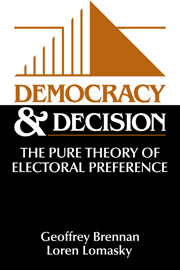Book contents
- Frontmatter
- Contents
- Preface
- 1 Ethics, politics, and public choice
- 2 The logic of electoral choice
- 3 The nature of expressive returns
- 4 The analytics of decisiveness
- 5 The theory of electoral outcomes: implications for public choice theory
- 6 From anecdote to analysis
- 7 Interpreting the numbers
- 8 Consensus, efficiency, and contractarian justification
- 9 Paternalism, self-paternalism, and the state
- 10 Toward a democratic morality
- 11 Constitutional implications
- Bibliography
- Index
1 - Ethics, politics, and public choice
Published online by Cambridge University Press: 05 June 2012
- Frontmatter
- Contents
- Preface
- 1 Ethics, politics, and public choice
- 2 The logic of electoral choice
- 3 The nature of expressive returns
- 4 The analytics of decisiveness
- 5 The theory of electoral outcomes: implications for public choice theory
- 6 From anecdote to analysis
- 7 Interpreting the numbers
- 8 Consensus, efficiency, and contractarian justification
- 9 Paternalism, self-paternalism, and the state
- 10 Toward a democratic morality
- 11 Constitutional implications
- Bibliography
- Index
Summary
The burden of proof should rest with those who suggest wholly different models of man apply in the political and economic realms of behaviour.
James M. Buchanan, “Politics Without Romance”Introduction
This book offers a theory of electoral preference. That is, it aims to give an account of what it is – or more particularly, what it is not – that voters do when they go to the ballot box in the large-scale collective decision-making processes that are characteristic of Western democracies. The basic analytical arguments generalize to a whole range of “collective” activities, but our focus throughout the book will be on electoral behavior, and our discussion proceeds almost exclusively in terms of that particular (and highly significant) example.
The topic is an almost totally neglected one; and this is, in itself, extraordinary. For one thing, the role of electoral considerations in shaping actual political decision making in most Western democracies seems entirely beyond dispute. For another, electoral constraints, and the connection these are presumed to imply between electoral outcomes and citizens' preferences over those outcomes, are commonly taken to be crucial features of genuinely democratic institutions and basic ingredients in establishing the normative case for democratic rule. Other bits of democratic apparatus may be important, but without periodic elections in which parties and/or candidates compete for office and/or alternative policies are offered for popular electoral scrutiny, we would simply not have democratic order as it has come to be understood.
- Type
- Chapter
- Information
- Democracy and DecisionThe Pure Theory of Electoral Preference, pp. 1 - 18Publisher: Cambridge University PressPrint publication year: 1993



